Have you ever heard of Jamaican apples? They’re a unique type of apple found in Jamaica, and they’re absolutely delicious! In this blog post, we’ll take a closer look at the Jamaican apple – its history, its health benefits, and how to select and prepare it. So if you’re looking for something new to try out in the kitchen, then read on!
Introduction to Jamaican Apples

Jamaican apples, also called Otaheite apples, are a sweet and juicy fruit native to Jamaica. Their Latin name is Syzygium Malaccense, but they are also known internationally as Malay Apples, Rose Apples or Mountain Apples. Jamaican apples have a smooth skin that can range in colour from green to yellow-green. Inside the crisp flesh has a mildly sweet flavour and aroma.
Jamaican apples can be eaten raw or cooked into pies, tarts and other desserts. They can also be juiced for making drinks like apple cider or used for making jams and jellies.
The fruit can also be dried to make snacks or added to salads for added sweetness. Jamaican apples are high in Vitamin C and other vitamins and minerals which make them a nutritious snack. In addition, due to their high levels of antioxidants they may even help protect against cancer and heart disease.
Jamaican apples are an important part of traditional Jamaican cuisine with many dishes including the fruit as an ingredient.
Popular dishes include curry goat with fried dumplings and ackee & saltfish with Jamaican apples providing the sweet contrast to the spicy flavours of these dishes.
So if you’re looking for a delicious way to enhance your meals or just enjoy some natural sweetness, why not give Jamaican apples a try?
History of the Jamaican Apple
The Jamaican Apple, also known as Syzygium malaccense and Malay apple, originates from Southeast Asia. It was introduced to Jamaica in 1793 as an ornamental and fruit tree.
Since then, it has become a popular fixture in Jamaican cuisine and culture. The sweet, juicy fruit is often used in drinks, desserts and jams.
The leaves of the tree are used for medicinal purposes, such as treating digestive problems and headaches. Its bright pink flowers are often used to make fragrant tea or added to salads for a burst of color. The Jamaican Apple is a beloved part of the country’s history and culture.
Nutritional Value of the Jamaican Apple
The Jamaican apple is a great source of nutrition, packed with Vitamins A and C. It can help improve vision, promote healthy hair growth, prevent the development of cataracts, nourish the skin and boost the immune system. It can also reduce the amount of ‘bad’ cholesterol in our bodies.
Eating a Jamaican apple every day can be a great way to get your daily dose of vitamins and minerals for better overall health.
Health Benefits of Eating Jamaican Apples
Eating Jamaican apples can provide numerous health benefits. Not only do they taste delicious, they are packed with essential vitamins and minerals that help promote overall wellbeing.
Eating Jamaican apples can help improve circulation, regulate blood pressure, promote hair growth, improve skin health, build stronger cells, bones, blood vessels, cartilage, muscles and teeth, prevent inflammation and boost energy levels.
Additionally, the turmeric in Jamaican apples have many anti-inflammatory properties that can assist in the reduction of pain and swelling associated with arthritis.
Furthermore, the phenolic compounds found in Jamaican apples have antioxidant properties which can help to protect your body from free radicals and reduce your risk of developing certain types of cancer. So why not give these tasty fruits a try? You’ll be sure to benefit from all their amazing health benefits!
What Makes Jamaica’s Apples Unique?

Jamaican apples have a unique shape and flavor that sets them apart from other varieties. They are pear-shaped with a single large seed in their core, although some can also be found in a slightly round shape.
When matured, the apple skin is deep red to purple in color and the flesh is yellowish-green or white. The flavor of Jamaican apples is tart and sweet, making them a great choice for baking or juicing.
What makes these apples truly special, however, is the unique combination of local produce and spices that they’re grown with.
This gives them an extra layer of flavor that you don’t get with other types of apples. Additionally, Jamaican apples are known for being extremely juicy and flavorful, making them ideal for adding to salads and other dishes as well.
How to Choose a Good Quality Jamaican Apple
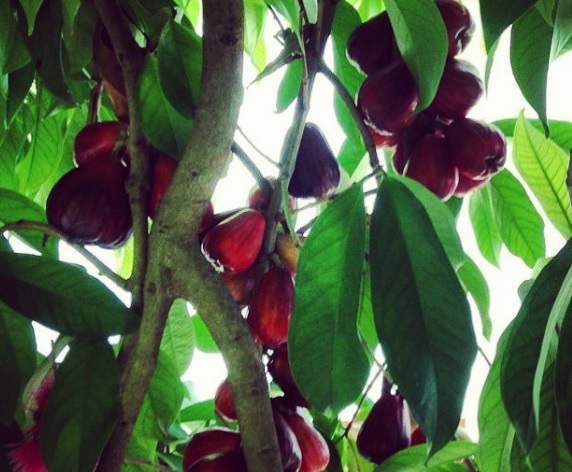
When looking for a good quality Jamaican apple, there are a few things to consider. First, look for fruits that have a bright, vibrant color.
If the apples appear dull or have discoloration, they could be past their prime. Additionally, pick apples that feel heavy and have smooth skin with no bruises or blemishes. Finally, smell the apples: if they have a sweet aroma it is likely a sign of quality.
When selecting an apple variety, remember that some are better for eating and others for baking. For example, Red Delicious apples are great for pies and other desserts because of their sweet taste and firm texture when cooked. On the other hand, Granny Smith apples are ideal as snacks due to their tartness and crunchy texture when eaten raw.
Finally, always make sure to buy your Jamaican apples from reliable sources like Island Herbs & Spices or other local markets with high-quality products. This will ensure that you get the freshest and most flavorful Jamaican apples available!
Different Varieties of Jamaican Apples
Jamaican apples come in a variety of colors, flavors, and sizes. From the sweet Golden Delicious to the tart Granny Smith, there’s an apple for every taste. For those looking to add a little extra kick to their favorite cocktail, many have experimented with variations of the classic Jamaican Apple recipe.
To give it a Caribbean twist, mix Ginger beer with a splash of Coruba Jamaican Rum and fresh lime juice. The combination of sweet and tart flavors creates a unique tropical flavor that is sure to be the perfect addition to any party!
Ways to Enjoy Eating a Jamaican Apple
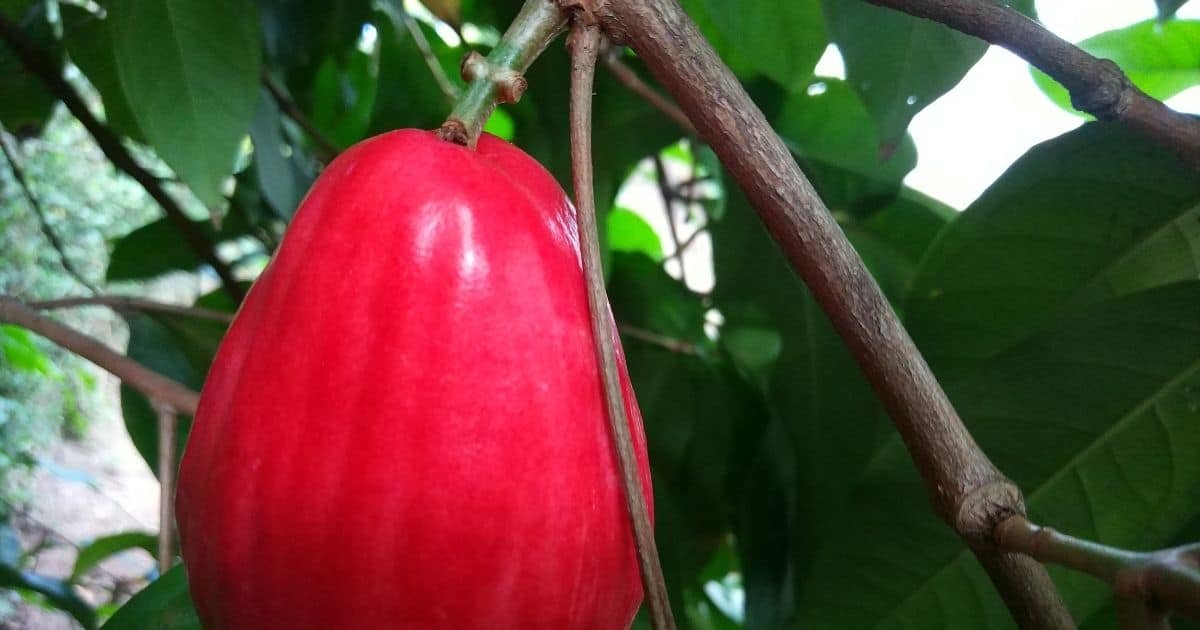
Eating a Jamaican apple can be an enjoyable way to get your daily dose of vitamins and minerals. The sweet, crisp fruit has a unique flavour that is sure to please the palate. There are several different ways you can enjoy this delicious snack. Here are some ideas on how to make the most of this tropical treat:
- 1. Slice it up – Slice the Jamaican apple into wedges or cubes and eat as is, or top with cinnamon for an extra burst of flavour.
- 2. Baked apples – For a warm, comforting treat, try baking the Jamaican apple in the oven with some butter and brown sugar for a delicious dessert that won’t disappoint.
- 3. Jam-filled apples – Core out the middle of an apple and fill it with your favourite jam or jelly for a delectable snack that packs in extra sweetness and flavour.
- 4. Apple salad – Chop up pieces of Jamaican apple and mix with lettuce, nuts, dried cranberries and feta cheese for a refreshing salad that’s full of texture and flavour.
- 5. Apple smoothie – Blend together a Jamaican apple with some yogurt, honey, cinnamon and nutmeg for a healthy breakfast drink that will leave you feeling energised throughout the day.
No matter how you choose to enjoy it, eating a Jamaican apple is sure to be an enjoyable experience!
The Best Recipes for Cooking with Jamaican Apples
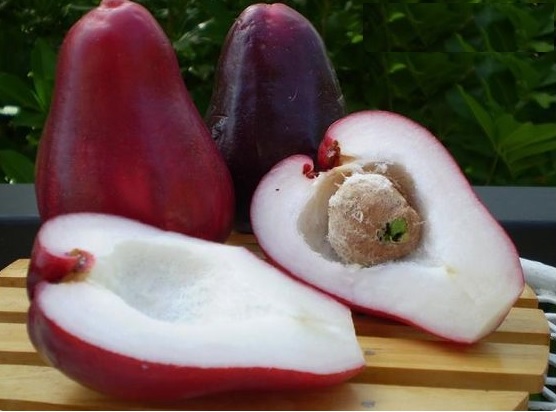
Jamaican apples are a sweet, juicy fruit that can be used to make a variety of delicious recipes. From traditional Jamaican dishes like oxtail stew and jerk chicken to more exotic creations such as Jamaican apple pie or even an apple-based alcoholic drink, these apples can bring a unique flavor to any dish.
Whether you’re looking for an appetizer, a main course, or a dessert, there are plenty of recipes out there that use these sweet apples. Oats porridge is an especially popular dish in Jamaica and pairs perfectly with the tartness of the apples.
For those looking for something more adventurous, try creating your own version of Dark N Stormy using Jamaican rum and freshly squeezed lime juice mixed with the sweet flavour of Jamaican apples.
No matter what you choose to make, any recipe involving Jamaican apples is sure to be a hit at your next dinner party!
Preservation Techniques for Storing Jamaican Apples
Preserving jamaican apples can be a great way to enjoy their sweet flavor for longer. There are several techniques that can be used to store jamaican apples and keep them fresh for extended periods of time.
One popular method is to freeze the apples. To do this, simply wash and dry the apples, then wrap them individually in plastic wrap. Place them in an airtight container and store in the freezer. Thawing before eating is recommended.
Another preservation technique is to make apple butter or apple sauce from the jamaican apples. This involves cooking down the apples with spices, sugar and water, then storing in an airtight container for up to three months in the refrigerator.
Lastly, making jams and preserves from jamaican apples is a great way to extend their shelf life even further. To make jams or preserves, simply cook down the fruit with sugar and lemon juice until it forms a thick spreadable mixture, then store in air-tight jars or containers in a cool place (like a pantry). These will last up to six months if stored properly.
Growing Your Own Jamaican Apple Trees at Home
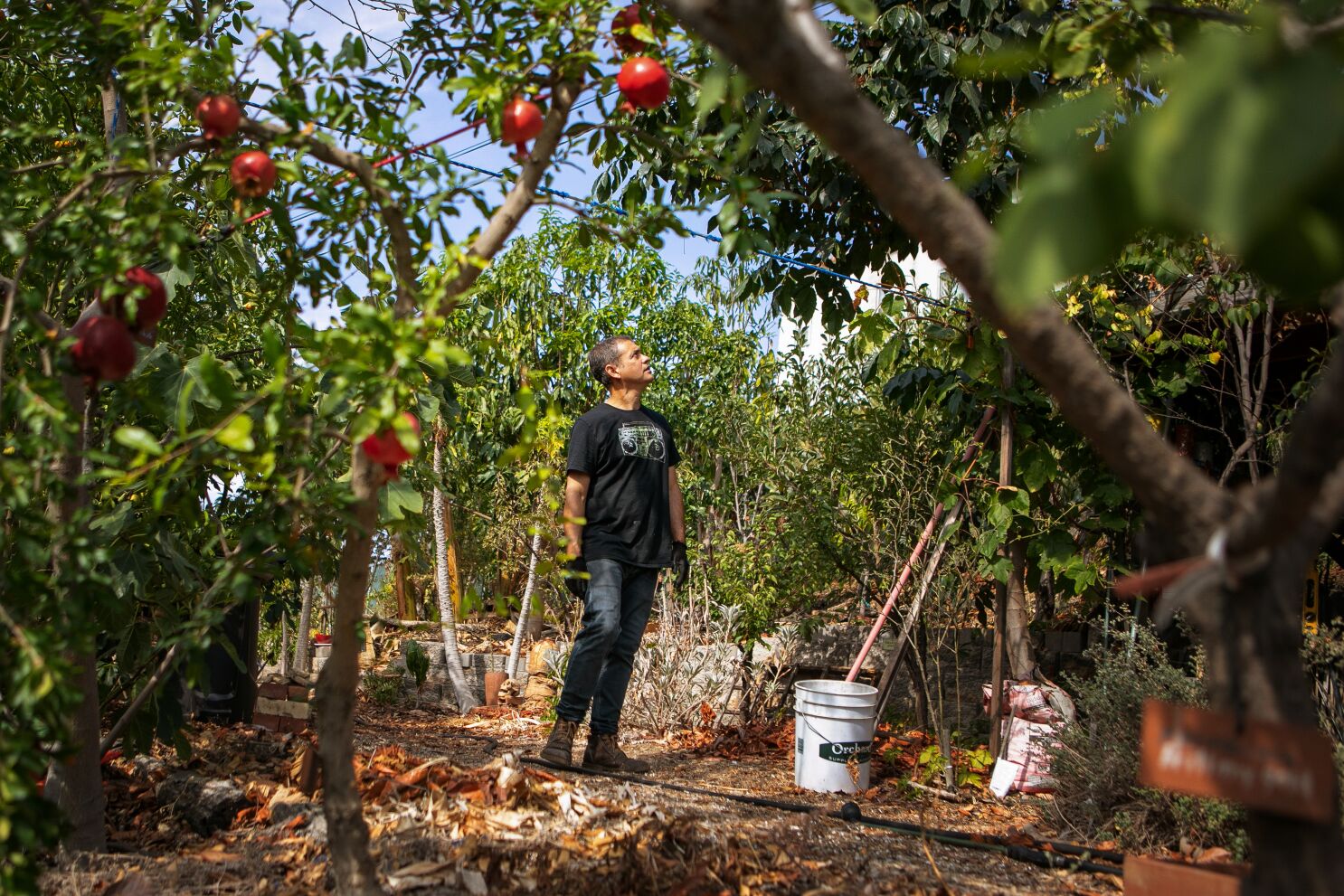
Growing your own Jamaican apple trees at home is a rewarding experience. The sweet, tart flavor of the apple is unique and can be enjoyed throughout the year. With proper care and maintenance, it’s easy to grow your own Jamaican apple trees in your garden or backyard.
The first step is to choose the right variety of apple tree for your area. Look for varieties that are suited to the climate and soil conditions where you live. Consider factors such as the amount of sun, temperature, humidity and rainfall when selecting an apple tree for your garden.
Once you have chosen an appropriate variety, prepare the soil for planting by adding compost or aged manure to enrich it with vital nutrients. Plant the tree at least 15 feet away from any buildings or other obstacles in order to provide ample space for growth and development. Make sure that the tree receives plenty of sunlight each day as well as regular irrigation during dry periods.
Keep up with regular maintenance and pruning throughout the year to ensure your jamaican apples continue growing strong and healthy. You may need to use natural insect repellents such as neem oil or garlic spray occasionally if pests become a problem.
Harvesting can begin when fruit appears on the branches in late summer or early fall depending on when they were planted. Enjoy your homegrown jamaican apples fresh off the tree!
Precautionary Measures When Picking and Eating Wild or Organic Jamaica Apples
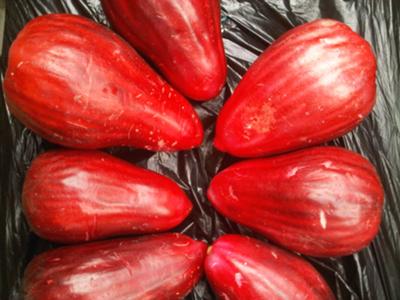
When picking and eating wild or organic Jamaica apples, it is important to take precautionary measures. First, make sure the apple looks healthy and is not rotten or damaged.
Before consuming any wild or organic fruit, it is essential to thoroughly wash the surface of the apple to remove any dirt, pesticides or other contaminants that may have come in contact with the fruit.
Additionally, it is important to cook wild or organic apples before eating them as they may contain harmful bacteria that can cause food poisoning if ingested in their raw state.
Finally, if any signs of illness occur after eating the apple, contact a doctor immediately. Following these precautionary steps can help ensure a safe and enjoyable experience when picking and eating wild or organic Jamaica apples.
Planting and Caring for Your Own Jamaica Apple Tree

Planting and caring for your own Jamaica apple tree is a rewarding experience. The jamaican apple tree is a tropical evergreen with fragrant white flowers and large, delicious apples. Planting and caring for your own jamaican apple tree can be done in just a few simple steps.
First, choose a location that has plenty of sunlight and well-draining soil. It’s best to plant your jamaican apple tree in the spring or early summer when the weather is warm enough for it to thrive.
Dig a hole that’s twice as wide as the root ball of your jamaican apple tree and mix in some compost or fertilizer to give the soil extra nutrients. Place the tree in the hole making sure that it’s planted at the same depth it was growing before, then backfill with soil and tamp down lightly. Water well after planting to help settle the soil around the roots.
Caring for your jamaica apple tree includes providing adequate water, pruning, fertilizing, and protecting from pests and disease.
Make sure that you water regularly during dry spells so that the soil doesn’t dry out completely. Prune any dead branches or crossing branches to encourage healthy growth.
Fertilize with an all-purpose fertilizer every 6-8 weeks during active growth periods to help keep your tree healthy and strong. And lastly, keep an eye out for pests like aphids or fungal diseases like powdery mildew which can
Environmental Impact of Growing and Consuming Jamaica Apples
Growing and consuming Jamaica apples has a considerable environmental impact due to their production and consumption.
The production of apples requires land, water and energy resources and contributes to the emission of greenhouse gases.
Additionally, the transportation of Jamaica apples from farm to market results in further emissions as well as increased demand for packaging materials.
When consumed, Jamaica apples have an impact on health. Eating an apple a day has been linked to reducing the risk of certain types of cancer and other diseases, such as diabetes and heart disease.
However, due to the use of pesticides and other chemicals during production, there is potential for contamination that can increase health risks when consuming Jamaica apples.
The Ministry of Health and Wellness, Jamaica and The Pan American Health Organization are working together to reform environmental impact assessment regulations in order to ensure that the growing and consumption of Jamaica apples is done safely and sustainably.
These regulations include monitoring air pollution levels around apple farms, testing water quality near by rivers or lakes used for irrigation purposes, implementing proper storage techniques for pesticide use, as well as encouraging farmers to adopt organic farming practices.
Wrapping up, growing and consuming Jamaica apples carries with it a significant environmental impact but with proper regulations in place these impacts can be minimized while still enjoying all the health benefits associated with eating an apple a day.
Conclusion

The Jamaican Apple is a unique fruit native to Jamaica. It has a sweet and tart flavor that can be eaten fresh or used in various recipes.
It has many health benefits, such as helping to reduce inflammation, boost immunity, and improve digestion.
Additionally, the Jamaican Apple contains significant amounts of Vitamin C and antioxidants, making it a great source of nutrition for those looking for an extra boost of energy or vitamins.
